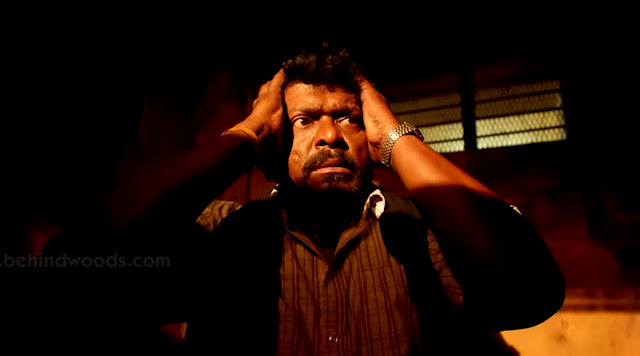OTHTHA SERUPPU SIZE 7 (2019)
 |
| Critic - No.171 |
Director: Parthiban Radhakrishnan
Producer: Parthiban Radhakrishnan
Casts: Parthiban Radhakrishnan
Language: Tamil
Genre: Crime / Drama
Music:
SYNOPSIS:
An emotionally unstable murder, Masilamani (Parthiban) suspect defends himself to a few cops which helps in unfolding some intriguing revelation.
REVIEW:
R.Parthiban is one of the most unique storytellers in Indian cinema who constantly have tried to push boundaries in the industry. But of course, a fair share of his previous films have backfired, while some gems went by without being given the right recognition it deserves. Nothing has dampened the spirits of this fighter and he comes with another innovative attempt with ‘Oththa Seruppu’ that features a solo act by himself.
He gets us hooked with the very first scene where Masilamani (Parthiban) gets accused of the murder and starts defending himself through his arguments that plays out more like a neurotic rant. Through his sketches of flashback that he narrates, the cops are left puzzled with more and more contradicting facts which prevents them from getting anything concrete to prove a case against him. Just like the psychologist and cops that interrogate him, the audience takes a seat of an investigator role throughout the film, trying to piece the rambles of Masilamai to figure out what really happened.
Even though it’s a solo act, Resul Pookuty’s sound design and the use of voices to illustrate flashbacks ensure that we are seeing the different worlds without actually looking at it. Kudos to all the dubbing artistes who brought life into characters that were physically not present at all. Parthiban also uses other diegetic sounds to fill up the characters presence by playing Ilaiyaraaja’s music not to lazily signify the past (like how it is common used in films) but to shape the character of Masilamani’s wife, who’s crazy about Ilaiyaraaja’s music. She’s from a village and her intro is signified by faint strains of ‘Senthoorapoove’ from 16 Vayathinile, the most iconic village film of Tamil cinema. A youthful stretch is coloured by ‘Ilamayenum Poongatru’ and when this woman is suspected of unfaithfulness, we hear a bit of ‘Ennullil Engo’ from Rosapoo Ravikkaikari, the story of a wife who strayed. It’s astonishing because we never see this woman but the collages of Illayaraja’s music helps to fill in her absence.
There are several hallucinatory and surreal moments in the film where the audience are left bewildered on whether whatever Masilamani is saying is genuine or sheer manipulation whenever he deviates from the main plot and rambles about random subjects. Through cinematographer Ramji’s symbolic and POV angles of Masilamani, we are shuttled between confrontational angles (breaking the fourth wall) and indirect shots through mirrors and LCD screens of a DSLR camera, constantly questioning whether the stories are true or just a staged act of a person who is trying to put on a mask to escape.
Despite the innovative structure, one can’t deny the fact that the theatrical staging of the actor Parthiban (perfect lighting and refined dialogue delivery) pulls us back from the reality that director Parthiban attempts to create. But it is definitely an engaging and successful attempt of a claustrophobic narrative compared to Kudaikul Mazhai (2004) Parthiban’s previous film that shared the similar idea. Of course, that said, by the time the film ends, we can’t help but to give a standing ovation for this creative, heartening film that takes a very important socio-political stand with a very bold treatment.
VERDICT:
Radhakrishnan Parthiban's arresting performance and intelligent writing ensures an engaging emotional thriller that oozes with cinematic innovation.
CELLULOID METER- 4.5/5:




.jpg)
Comments
Post a Comment